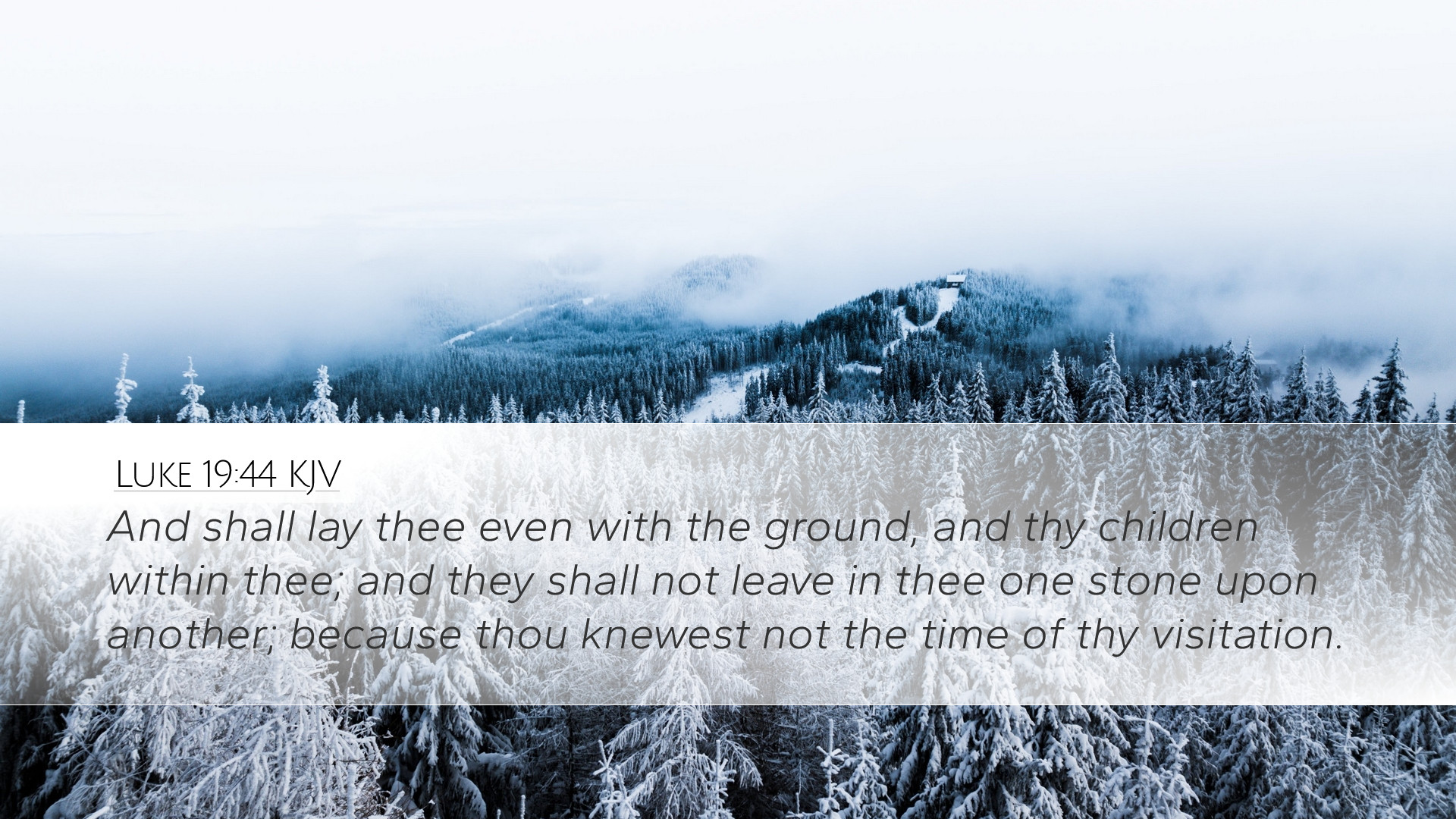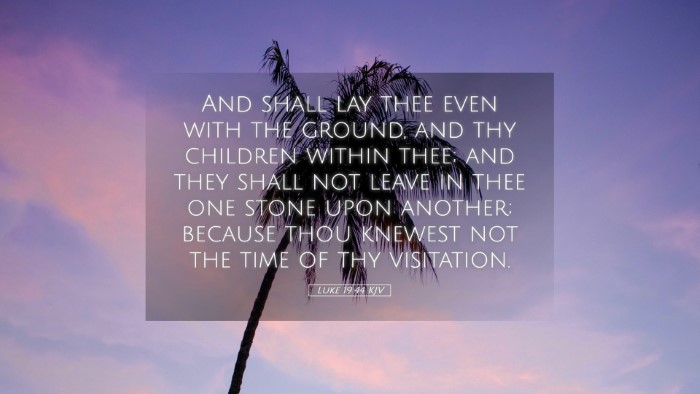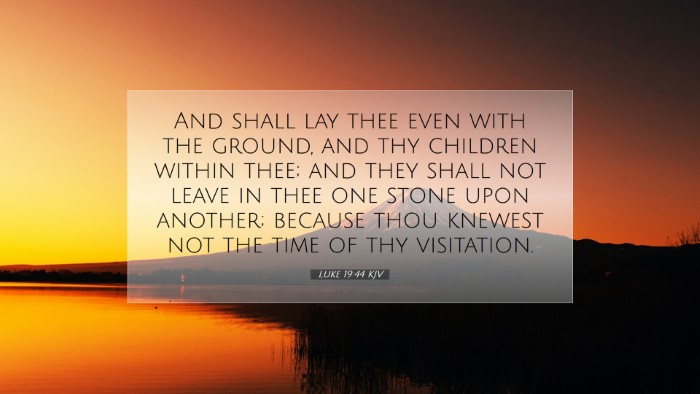Commentary on Luke 19:44
Verse: Luke 19:44 - "And shall lay thee even with the ground, and shall lay thy children within thee; and they shall not leave in thee one stone upon another; because thou knewest not the time of thy visitation."
Contextual Introduction
The verse carries profound significance in the narrative of Jesus’ lamentation over Jerusalem. This passage occurs during the final week of Jesus' earthly ministry as He approaches Jerusalem, foreseeing the calamities that would befall the city in response to its rejection of Him as the Messiah. The prophetic nature of this statement reveals both the heart of Christ and the tragic destiny of a nation that failed to recognize the Messiah during His visitation.
Insights from Matthew Henry
Destruction Foreseen: Matthew Henry emphasizes the dire judgment predicted by Christ. He notes that the devastation prophesied here is not merely physical but also spiritual. The phrase "shall lay thee even with the ground" illustrates an utter destruction, a metaphorical leveling of the city due to its unfaithfulness.
Desolation of Children: Henry elucidates the phrase "and shall lay thy children within thee." This suggests that the consequences of Jerusalem’s failure will affect future generations. The consequences of rejecting God’s message are thus extended, presenting a critical teaching on corporate responsibility and the burden of sin.
Understanding Your Time of Visitation: The final clause highlights that Jerusalem did not recognize the critical moment of their visitation. Henry beautifully underscores that the failure to discern God’s working in their midst leads to tragically missed opportunities and impending judgment.
Insights from Albert Barnes
Historical Context: Albert Barnes places emphasis on the historical implications of Jesus’ prophecy. He notes that the destruction of Jerusalem occurred in AD 70 when the Romans leveled the city, fulfilling Jesus's predictions. Barnes identifies this event as a manifestation of divine retribution for the rejection of Christ.
The Importance of Prophecy: Barnes elaborates on the significance of prophetic warnings. They serve not only to inform about future events but to call people to repentance. The prophecy is a reflection of God's justice as well as His mercy—warning them of impending doom while still offering a chance for redemption.
Visitation as a Divine Encounter: The term "time of thy visitation" is elaborated by Barnes as a unique moment in which God, through Christ, interacted directly with His people. Understanding this visitation was crucial for Jerusalem’s recognition of God’s purposes. The failure to recognize this moment speaks volumes about spiritual blindness.
Insights from Adam Clarke
Theological Insights: Adam Clarke elaborates that the lament over Jerusalem reflects not just judgment but sorrow. Clarke notes that Jesus wept for the city, indicating His compassion and a desire for their repentance. This emotional aspect of Christ showcases His role as a shepherd who mourns over lost sheep.
Symbolism of Stones: Clarke discusses the significance of "not leaving one stone upon another." This symbolizes total destruction, serving as a stark warning of the consequences of disobedience. It shows the extent of God's holiness and the seriousness with which He takes the rejection of His grace.
Call for Reflection: Clarke invites readers to reflect on their own lives and the times they may fail to recognize God's visitation. He advocates for the church to be attentive to God's guidance and prompts, as spiritual negligence can lead to severe ramifications.
Theological Implications
This passage invites deep theological reflection on the nature of God's judgment and mercy. The intertwined themes of warning, lamentation, and the urgency of recognizing divine visitation set a critical framework for understanding God's engagement with humanity.
Prophetic Warnings: The prophetic nature of Jesus' words serves as a potent reminder that God continues to send messages through His servants. The call to repentance rings true across the ages, urging people to align themselves with God's will.
Corporate Responsibility: The notion that the consequences of sin extend beyond the individual is a vital aspect. The rejection of Christ by the leaders of Jerusalem led to severe consequences for the entire city, highlighting the important biblical principle of collective accountability.
Pastoral Applications
Pastors can draw several key applications from Luke 19:44:
- Recognition of God's Activity: Encourage congregants to be vigilant in recognizing God's workings in their lives and in their communities.
- Importance of Repentance: Emphasize the need for both individual and corporate repentance, calling the church to discern God's voice amidst distractions.
- Compassionate Ministry: Foster a pastoral approach that mirrors the compassion of Christ, weeping with those who suffer while also speaking truth into situations of unfaithfulness.
Conclusion
Luke 19:44 serves as a dire reminder of the stakes involved in missing God's visitation. The insights drawn from the commentaries of Henry, Barnes, and Clarke provide a rich exploration of the emotional, spiritual, and historical layers embedded in this passage. Believers are called to both reflect and act upon the profound truths contained herein, embracing the urgency of today while remembering the lessons of history. Ultimately, Christ’s lament over Jerusalem implores us to seek Him earnestly and to recognize His presence and purposes in our lives.


